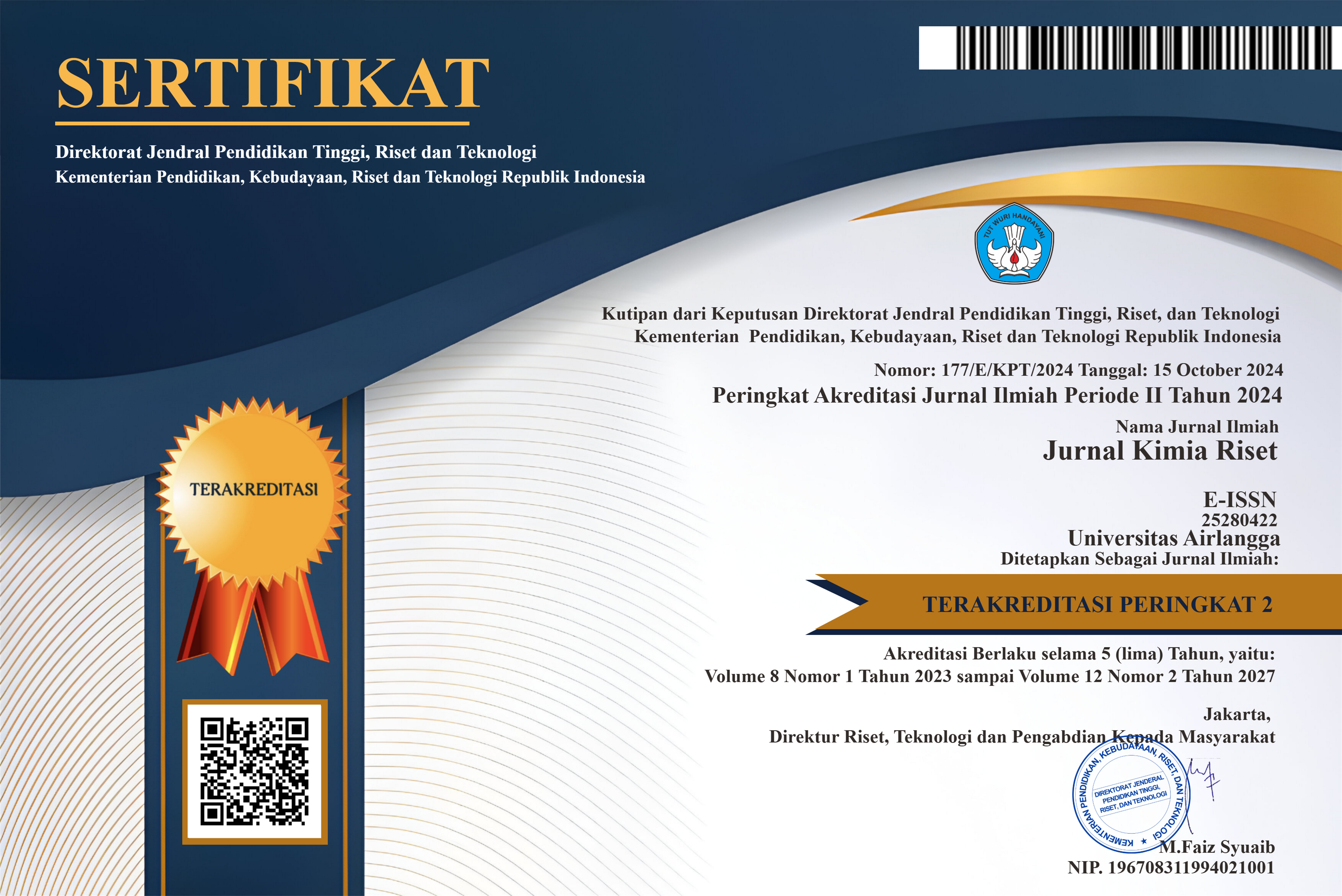SYNTHESIS OF POROUS CARBON MATERIAL PROPYLENE MEDICAL MASK AS ADSORBENT HEAVY METAL IRON (Fe) IN WATER EX-TIN MINING BANGKA BELITUNG
Downloads
Bangka Belitung Islands Province faces severe environmental challenges, exacerbated by
illegal tin mining activities leading to heightened pollution levels, particularly in stagnant
water within former tin mining holes, reaching depths of up to 40 meters. The presence of
iron metal (Fe) in this water poses a health risk, potentially damaging intestinal walls and
compromising lung function upon ingestion. This study presents a novel approach to address
this issue by synthesizing porous carbon material from propylene waste sourced from
medical masks. The process involves initial sulfonation for sterilization and pore size
enhancement, followed by activation using KOH and carbonization at 750 °C.
Characterization methods validate the successful synthesis, including FTIR highlighting
polypropylene groups at 822 cm-1, XRD indicating graphite carbon with high crystallinity,
and SEM exhibiting rod shapes and cavities at 5,000í— magnification. The adsorption test
demonstrates outstanding performance, with porous carbon exhibiting a 100% adsorption
efficiency in purifying water, eliminating odors, and reducing iron (Fe) levels. This
innovative method effectively reduces iron levels in stagnant water environments, providing
a sustainable solution to environmental pollution, particularly in Bangka Belitung.
Badan Standardisasi Nasional., 1995. SNI 06-3730-1995 Tentang Arang Aktif Teknik. Jakarta: Badan Standardisasi Nasional.
Chen, W. M., Luo, M., Yang, K., Zhou, X. Y., 2020. Microwave-assisted KOH activation from lignin into hierarchically porous carbon with super high specific surface area by utilizing the dual roles of inorganic salts: microwave absorber and porogen. Microporous Mesoporous Mater, 300:110178.
Efiyanti, L., Wati, S. A. and Maslahat, M., 2020. Pembuatan Dan Analisis Karbon Aktif Dari Cangkang Buah Karet Dengan Proses Kimia Dan Fisika. Jurnal Ilmu Kehutanan, Volume 14, Pp. 94-108.
Fitria, H., Ahmad, T. L. and Rizaq, S. U., 2022. Pemanfaatan Masker Limbah COVID-19 Sebagai Upaya Mengurangi Pencemaran Lingkungan. Metode Jurnal Teknik Industri, 8(1), Pp. 41-50.
Hu, X. and Lin, Z., 2021. Transforming Waste Polypropylene Face Masks Into S-Doped Porous Carbon As The Cathode Electrode For Super Capacitors. Ionics, Volume 27, Pp. 2169-2179.
Idrus, R., Lapanporo, B. P. and Putra, Y. G., 2013. Pengaruh Suhu Aktivasi terhadap Kualitas Karbon Aktif Berbahan Dasar Tempurung Kelapa. Jurnal Prisma Fisika, Volume 1, pp. 50-55.
Kurnia, A., 2023. Identifikasi Logam Berat Pada Air Kolong Dan Mikroba Potensial Untuk Bioremediasi Di Lahan Pasca Penambangan Timah. Jurnal Geominerba, 8(1), pp. 36-43.
Laos, L. E., Masturi and Yulianti, I., 2016. Pengaruh Suhu Aktivasi Terhadap Daya Serap Karbon Aktif Kulit Kemiri. Snf, Volume 5.
Min, J. K., Zhang, S., Li, J, X., Klingeler, R., Wen, X., Chen, X. C., Zhao, X., Tang, T., Mijowska, E., 2019. From polystyrene waste to porous carbon flake and potential application in supercapacitor. Waste Manag, 85:333–340.
Meyzilia, A., 2018. Pemanfaatan Air Kolong Bekas Tambang Timah Sebagai Penambah Sumber Air Tanah Menggunakan Lubang Kompos Di Bangka Belitung. Jurnal Pendidikan Ilmu Sosial, 27(1), Pp. 22-30.
Murraya, Taufiq-Spj, N. and Supriyantini, E., 2018. Kandungan Logam Berat Besi (Fe) Dalam Air, Sedimen Dan Kerang Hijau (Perna Viridis) Di Perairan Trimulyo, Semarang. Journal Of Marine Research, 7(2), Pp. 133-140.
Permenkes RI No 32 tahun 2017. Peraturan Kesehatan RI Nomor 32 tahun 2017 tentang Standar Baku Mutu Kesehatan Lingkungan dan Persyaratan Kesehatan Air Untuk Keperluan Higiene Samitasi, Kolam Renang, Solus Per Aqua, dan Pemandian Umum.
Ramayana, D., Royani, I. and Arsyad, F. S., 2017. Pembuatan Carbon Black Berbasis Nanoserbuk Tempurung Biji Karet Menggunakan High Energy Milling. Jurnal MIPA, 40(1), Pp. 28-32.
Ridhuan, K. and Suranto, J., 2016. Perbandingan Pembakaran Pirolisis Dan Karbonisasi Pada Biomassa Kulit Durian Terhadap Nilai Kalori. Jurnal Teknik Mesin (TURBO), 5(1), Pp. 50-56.
Said, N. I., 2007. Pengolahan Air Minum dengan Karbon Aktif Bubuk (Prinsip Dasar Perhitungan, Perencanaan Sistem Pembubuhan dan Kriteria Disain). JAI, 3(2), pp. 96-110.
Sharma, M. D., and Krupadam, R. J., 2021. Adsorption-desorption dynamis of synthetic and naturally weathered mirofibers with toxic heavy metals and their ecological risk in an estuarine ecosystem, 112198.
Silalahi, A. S. and Hendrasarie, N., 2021. Pemanfaatan Limbah Masker Bedah 3 Limbah Plastik Polyetilen Sebagai Adsorben Untuk Menurunkan Kandungan Deterjen Dan Fosfat Pada Limbah Industry Laundry. Teknik Lingkungan, 2(1), Pp. 51-59.
Sun, Q., Liu, T., Wen, T. and Yu, J., 2023. Porous Carbon Tubes from Recycling Waste COVID-19 Mask for Optimization Of 8 Mol% Y2O3-Doped Tetragonal Zirconia Polycrystaline Nanopowder. Materials Today Chemistry, Volume 30, Pp. 1-12.
Victory, S. et al., 2021. The Utilization of Medical Mask Waste as A High-Quality Nanofiber Material: A Review. Indonesian Journal of Chemical Science, 10(2), Pp. 89-94.
Yusuf, M., 2011. Model Pengembangan Kolong Terpadu Pasca Penambangan Timah di Wilayah Bangka Belitung. Jurnal Makalah Ilmiah Sriwijaya, 18(11), pp. 669-681.
Copyright (c) 2024 Jurnal Kimia Riset

This work is licensed under a Creative Commons Attribution-NonCommercial-ShareAlike 4.0 International License.
COPYRIGHT NOTICE
1. By submitting the article to Jurnal Kimia Riset (JKR), the author has agreed to transfer some of the copyrights to the publisher of the research chemistry journal, Universitas Airlangga, indicated in the Copyright Transfer Agreement.
2. Authors still retain significant rights to use and share their own published articles for non-commercial purposes subject to Creative Commons Attribution-NonComercial 4.0 International License
3. All publications (printed/electronic) are open access for educational purposes, research, library, and other non-commercial purposes. Besides the purposes mentioned above, the editorial board is not responsible for copyright violations.














